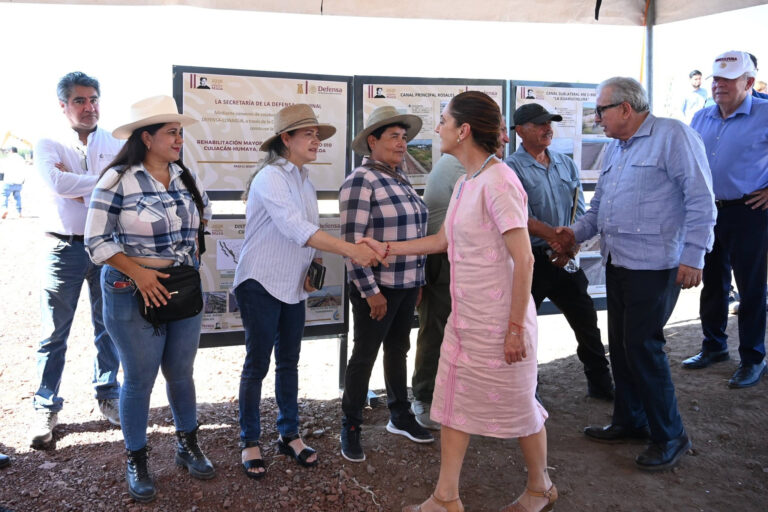“There Will Be No Turning Back” on Social Policy for Women
This article by Enrique Méndez originally appeared in the August 11, 2025 edition of La Jornada, Mexico’s premier left wing daily newspaper.
Mexico City. In the transformative movement that has enabled the advancement of rights and gender parity in the federal government, Congress, and social policy in favor of women, “there will be no turning back,” said Secretary of the Interior Rosa Icela Rodríguez at the opening of the 16th Regional Conference on Women in Latin America and the Caribbean, which focuses on the care system.
“While in other parts of the world war prevails and respect for human rights is being reversed, today in Mexico we are building peace, governance with justice, sustainable development with well-being, humanism, and a gender perspective,” she noted.
From the podium of the Chamber of Deputies, where the conference is taking place, the official emphasized that public policy decisions in the country are made by women. She highlighted that for the first time, a woman, Claudia Sheinbaum, has held the presidency of the country, and this is the second time there has been a gender-balanced cabinet.
She maintained that these advances were achieved both through women’s struggles and through the changes promoted during the previous six-year term, “and now with the drive of a brave, courageous, honest, intelligent woman committed to the people and the defense of national sovereignty: President Claudia Sheinbaum.”
“A badass!” shouted Oaxacan representative Irma Juan Carlos (Morena) from her seat.
“That’s it!” the head of the Interior Department seconded.
The forum’s central theme is: Transformations in the political, economic, social, cultural, and environmental spheres to promote a caring society and gender equality.
In this context, Raquel Serur Smeke, Undersecretary for Latin America and the Caribbean at the Ministry of Foreign Affairs, proposed that legislators approve a reform to a care system, changes that “are not a favor or a gesture of goodwill, but rather a historic debt to millions of Mexican women and families.”
She noted that “recognizing, redistributing, and remunerating care means recognizing human dignity and the right of all people to receive and provide care, without implying inequality, poverty, or discrimination. Closing the brutal inequality gaps that persist in Latin America and the Caribbean will only be possible if the demands that social movements have historically made regarding the exclusion of marginalized and discriminated people, such as women and Indigenous and Afro-descendant people, are addressed.”
Also speaking from the podium, José Manuel Salazar Xirinachis, executive secretary of the Economic Commission for Latin America and the Caribbean (ECLAC), said that while women have more years of education than men and increasingly occupy more decision-making positions, gaps persist in all countries.
He said that only 50 percent of women participate in the labor market, compared to 75 percent of men, and that their integration is marked by informality, the wage gap, and a disproportionate burden of unpaid care that limits their autonomy.
“For every 100 men living in poverty, there are 120 women. This structural inequality is exacerbated by the care crisis, characterized by growing demand due to an aging population, migration flows, epidemiological patterns, and chronic underinvestment in care,” he said.

This is a crisis that will worsen and disproportionately affects women, but is especially acute for the poorest, those living in rural areas, and young women, warned Ana Güezmes García, director of ECLAC’s Gender Affairs Division.
In turn, Sima Bahous, Assistant Secretary-General of UN Women, stated that the forum represents a path toward a care-based society, a global imperative that the region has championed with purpose and clarity.
“Women who bear the disproportionate burden of unpaid care deserve policies that recognize, redistribute, and compensate care as a public good. It is not a luxury; it is a political imperative. Democracy is fragile when civic space is restricted. We must protect participation, ensure that the rights of women and girls are not compromised, and that, in their diversity, they are supported and protected,” she emphasized.
She also called for accelerated progress in women’s political representation and governance, noting that, at the current pace, it would take 130 years to achieve equality in this area. “Girls born on this day don’t have to wait four generations for this change. We need decisive action to eliminate political violence against women,” she added.
The work continues in the chamber’s plenary session, and in the afternoon, the conclusions will be presented at the Alcázar of Chapultepec Castle.
-
Let’s Talk About Migration: Trumpist Persection
Millions of women who have endured unspeakable violence on their migration journey are now being persecuted in the United States by an extremely xenophobic and misogynistic government, led by Donald Trump,
-
Culture | Labor | News Briefs
Workers Occupy Culture Secretariat, Demand 13% Wage Increase
2,000 workers have been receiving incomes below Mexico’s minimum wage for over two years.
-
People’s Mañanera March 2
President Sheinbaum’s daily press conference, with comments on electoral reform, the gradual move to a 40 hour workweek, employment, national security strategy, and once again, the call for peace.




